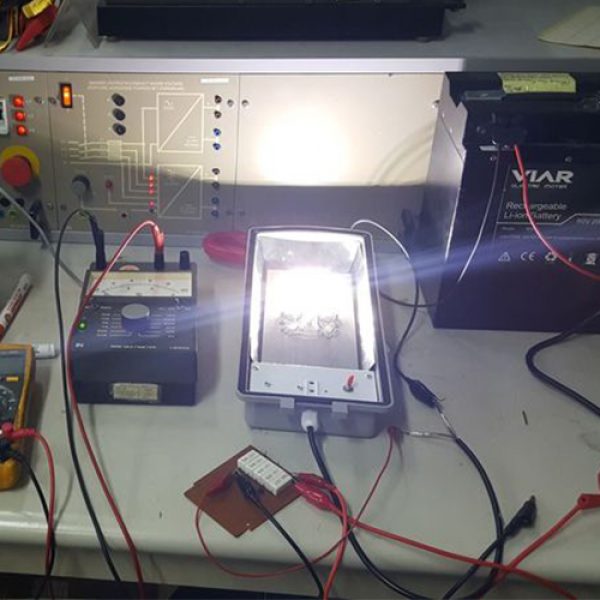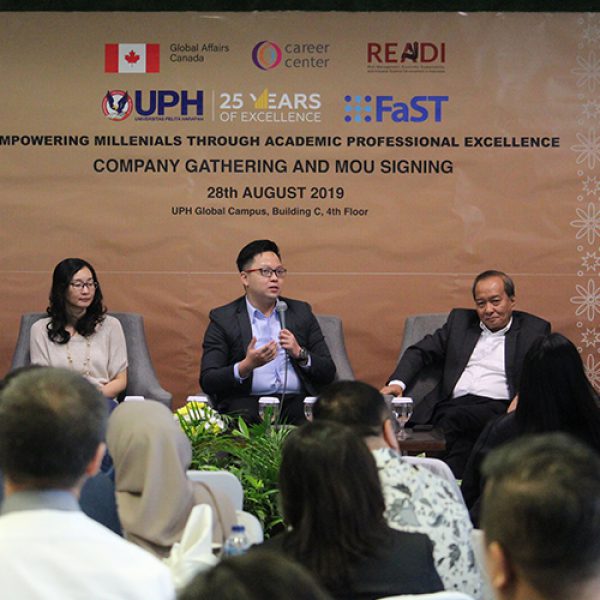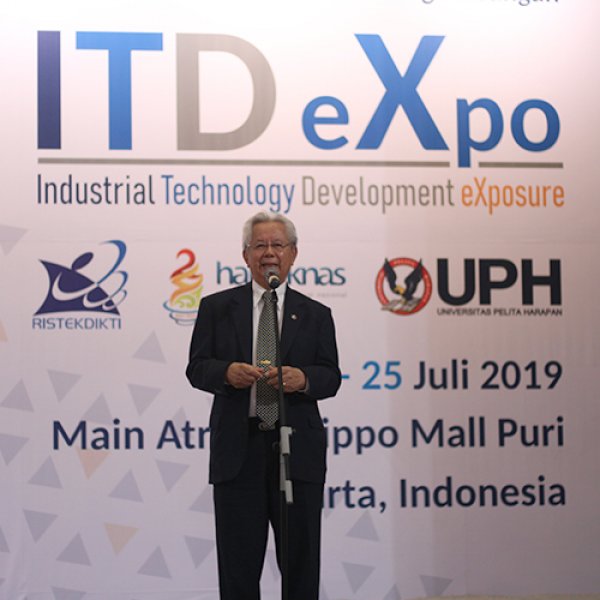2019
Electrical Engineering UPH Held a Workshop to Equip Students with Knowledge on Designing Solar Power Generation Systems.

The Electrical Engineering Study Program at UPH held a workshop about solar power plants with the title “How to Design Solar Power System: From Rooftop to Microgrid System” on 6 March 2019 at UPH Lippo Village campus. The workshop was led by the Ir. Azhar Kamal, M.Eng., who is experienced in building solar power systems in various regions in Indonesia. This workshop was filled with practical things related to the design of solar power generation systems, including rooftop and microgrid solar power systems for secluded areas. The discussed topics included counting and selecting devices, as well as an understanding of device specifications.
“Renewable energy has become a need for the world because developed countries have been incessant in utilizing it. The solar power system is a type of renewable energy. Indonesia is late in utilizing this. That is why the Ministry of Energy and Mineral Resources is pushing the people to use solar power systems,” explained Ir. Azhar Kamal.
The owner of PT Sumber Cahaya Cemerlang Jakarta, who has worked for a long time in Japan, recommends the use of rooftop solar power systems in Indonesia.
Ir. Azhar said, “Now there is a community using rooftop solar panels, promoting the use of solar power systems. The members of this community helped each other by, for example, helping each other report to the State Electricity Enterprise after installing the on-grid system.”
He explained that rooftop solar panels are beneficial because it reduces electricity use by the grid, and can even supply electricity to the grid. He also promoted the independent off-grid solar power system, which can run on its own, therefore beneficial for people in secluded areas.
“In the future, solar panels will become cheaper. In the last eight years, we have experienced an 85% reduction in costs. Research has also stated that solar panels will drop another 50% in costs. When that happens, we must participate in order to reduce carbon monoxide levels. Second, we can reduce electricity use, where the price of electricity is now Rp. 1400 per kWh. With solar panels, it is more practical and free. We must take advantage of the sun, which was created by God.”
Right now, the government and the Ministry of Energy and Mineral Resources are designing rooftop solar panels in Indonesia because the use of off-grid solar panels is a good solution in providing efficient electricity without producing loud generator set noises.
Ir. Azhar said, “The government has built a lithium battery factory in Morowali. The off-grid system will grow. Sooner or later all the households will set up their own solar power systems. The prices are already very competitive because batteries are manufactured by the government and solar panels are currently experiencing a drop in prices. This will not close off the possibility of making solar power systems with prices similar to buying a motorcycle.” He continued, “Electricity is the base technology that is needed in our lives. With electricity, other technologies can be built. In the future, there will be cars and motorcycles with solar charge, therefore they will no longer need fuel. With solar power systems, there will be no reliance on the State Electricity Enterprise, and it will be no problem if there is no Pertamina.”
With this innovation, Ir. Azhar Kamal hopes that the millennial generation will ready themselves when facing the trend in order to improve country and nation through the installation of rooftop solar panels in Indonesia.
He closed by saying, “These millennial students are going to be the witnesses of the rooftop solar panels’ revolution.”
However, the use of this type of energy is hindered by the new rule put forth by the Minister of the Ministry of Energy and Mineral Resources, which is no. 49 tahun 2018 rule. According to Henri P. Uranus, from the Electrical Engineering at UPH, the rule opened up a chance for the people to participate as energy producers by installing the rooftop solar panels. However, by cutting the kWh value that is exported to the State Electricity Enterprise to 65%, its real value is perceived as a half-hearted policy. It is expected that this policy should be reviewed so that it will not kill the people’s passion for solar power systems.
Furthermore, UPH Electrical Engineering program study inputted a course about solar power in a photonics course (with an emphasis on solar cell physics) and in industrial electronics (with an emphasis on solar power generation systems design, such as pico solar, solar PJU, or a small system for a household).
It is expected that the graduates will not be lacking in solar power knowledge and so that they will make use of it in their work. UPH’s Electrical Engineering constantly reminds the students of the International Day of Light and asks them to moderate workshops for middle schoolers about DIY solar lanterns in hopes of promoting this cool, new technology to them.



